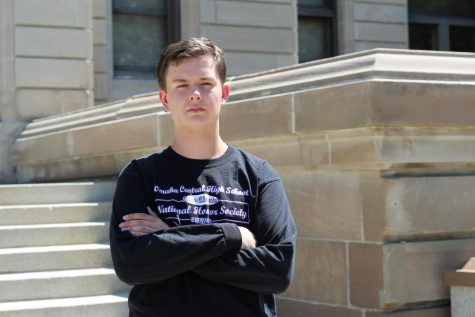New legislation would protect student journalists if successful
February 23, 2018
State Senator Adam Morfeld of the 46th Legislative district has introduced legislation which would protect student journalists from censorship when they publish non-libelous, non-slanderous materials, LB886. His interest in the issue of student censorship comes from a personal experience, when at high school in Sioux Falls, South Dakota his principal attempted to expel him for starting an independent student publication. He is now committed to ensuring that “young Nebraskans can experience the power of the First Amendment” so that they may “learn those civic skills at an early age.” His bill has been supported by national press freedom groups, such as the American Civil Liberties Union, Student Press Law Center and FIRE (Foundation for Individual Rights in Education). The bill, which is part of recent “New Voices” legislation which has popped up around midwestern states is currently being considered by the Judiciary Comm
LB886 has already had its hearing before the Judiciary Committee. This was held on February 8th and saw leaders of student press freedom weigh in with testimony and thoughts. According to Justine Garman, Benson’s journalism adviser, only three of the Judiciary’s members stood in true opposition, with Senator Ernie Chambers telling them “times are changing and it is time they change as well.” According to Garman, the three also only were opposed to school districts losing power under LB886, which is not something Garman believes will occur, as Principals will still have the right to prior review to assess how appropriate a story is or is not. Garman believes this bill “provides protection and retaliation for both the students and their advisers,” saying that currently “If they [the school district] do not like the stories the students write, they can reassign the adviser or fire him,” putting advisers, or journalism teachers, in quite a predicament, they can either have their students go after harder stories or play it safe. Garman has experienced this predicament for five of the six years in her career as a journalism adviser, she said it was “frustrating because I was not allowed to speak up and would be forced to do what I was told,” throughout the hearings she learned how fortunate it she is to be working as a Journalism advisor in Omaha Public Schools, as OPS follows a fairer standard for dealing with student journalism called the “tinker standard.” Garman also saw Student Journalists from Millard West speak before the committee in regards to their Journalism adviser being fired.
Chairing the Unicameral’s Judiciary Committee is State Senator Laura Ebke, representing the 32nd Legislative District. She said that she could support LB886 “as is.” According to her, “the impact on most schools will probably be minimal. It would theoretically allow student journalists a little more freedom from the limits that might be placed on them by school administrators and would protect teachers/advisors from retribution should their students write something that is controversial (yet well-sourced and accurate).” She also stated that the bill “will put more pressure on advisors and student journalists to be sure that they are following good journalistic practices—multiple sources, careful and clear writing.” This is why she is most concerned about very small high schools where Journalism is an extracurricular activity and loosely supervised by someone with no experience in Journalism, “I’m of the opinion that the success of implementation of this bill is dependent on responsible journalism, and someone being able to provide appropriate instruction and/or oversight for those who are practicing the craft,” she said. Senator Ebke does not believe this bill will reach the Unicameral in time to pass, as the Legislature is rapidly approaching the end of the session and priority bills will begin to be debated, without a priority and with it likely to be controversial in some quarters, LB886 is likely to be “killed” as the 105th Legislature comes to an end.














